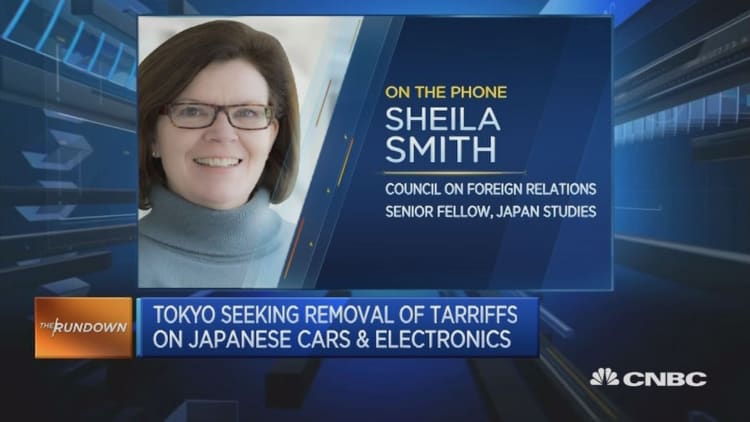Cherry blossom season begun earlier than expected in Tokyo this week in what may be an auspicious sign for scandal-hit Japanese Prime Minister Shinzo Abe.
For a month, allegations have been flying that Abe and first lady Akie Abe granted political favors to a right-wing education group for a real-estate deal but following a key piece of testimony on Thursday, the worst appears to be over for the head of state.
"It is increasingly unlikely that the scandal will fatally undermine the PM's administration," said Tobias Harris, Japan vice president at Teneo Intelligence, in a Friday note.
At the heart of the matter are reports that private educational institute Moritomo Gakuen bought heavily discounted government-owned land in Osaka for an elementary school. Morimoto's $1.2 million payment for the near 9,000 square meter area was a tenth of the cost of similarly sized plots nearby, according to local media.
The transaction, made public last month, fueled speculation that Morimoto used its connections with Abe's wife to obtain the cheap price. Akie was made honorary principal of the new school but quickly resigned when news of the land deal emerged.
On Thursday, Morimoto head Yasunori Kagoike testified under oath in parliament on the matter, saying he personally received an envelope containing $9,000 in cash from Akie during her September 2015 visit to Tsukamoto Kindergarten, a school operated by Morimoto. Akie has denied the transaction.
The scandal remains ongoing as Abe's approval ratings drop below the 60 percent level — opposition parties now want Akie to testify and finance ministry officials are expected to be questioned about the land sale — but many anticipate little damage to the PM's rule.
"Without additional evidence to corroborate Kagoike's story about the alleged donation, it is unlikely that it will significantly impact the prime minister," said Harris.
Jesper Koll, CEO of WisdomTree Japan and a longtime resident of the country, echoed those sentiments.
"Thursday's hearing was the climax of the scandal, and the bottom line is that the prime minister is highly likely to maintain his steadfast grip on power until 2021," he said in a note.
Scott Seaman, Asia director at intelligence firm Eurasia, also agreed Abe would not suffer any lasting damage, but warned that risks may increase if Ministry of Finance officials who arranged the land sale provided Morimoto with special deals or treatment.

Going forward, the affair won't impact the LDP's chances at July's Tokyo Assembly elections or snap lower house elections later this year on the back of a weak opposition, Koll and Seaman said.
There may be some short-term pain, however.
As Abe's critics pounce on the scandal, key legislative work in the current parliament session could slow, particularly regarding the 2017 budget, labor reform, and Emperor Akihiko's abdication, Seaman flagged.
Of course, not everyone believes Abe is in the clear.
If he fails to provide a convincing explanation behind the discount, it seems possible that he would be forced to resign, said Koichi Nakano, politics professor at Sophia University.
The PM is no stranger to transgressions, having resigned in 2007 over various factors that included scandals in his cabinet.
Morimoto's ultra-nationalist reputation also places Abe's credibility at stake.
At Tsukamoto Kindergarten, students recite the Imperial Rescript on Education — a royal decree that was the basis for Japan's militaristic education agenda before being abolished in 1947 in favor of more liberal values following World War II. The school operator also drew nation-wide criticism last month after a vice principal at Tsukamoto wrote a statement with derogatory descriptions of Chinese and Koreans that was distributed to parents.
Abe himself has been under criticism for proposing nationalist-tinged education policies so his association with an institute like Morimoto will fuel fears of his conservative political agenda, said Nakano.
"There is no denying the fact that the Abes had strong ties with the school, and that the school showcased exactly the kind of jarring patriotic education Abe wants to pursue."
In 2015, Abe's proposal of security bills that favored a more aggressive military fanned worries of a return to military aggression, a sensitive topic in Japan, where pacifism has dominated since the end of WWII.

